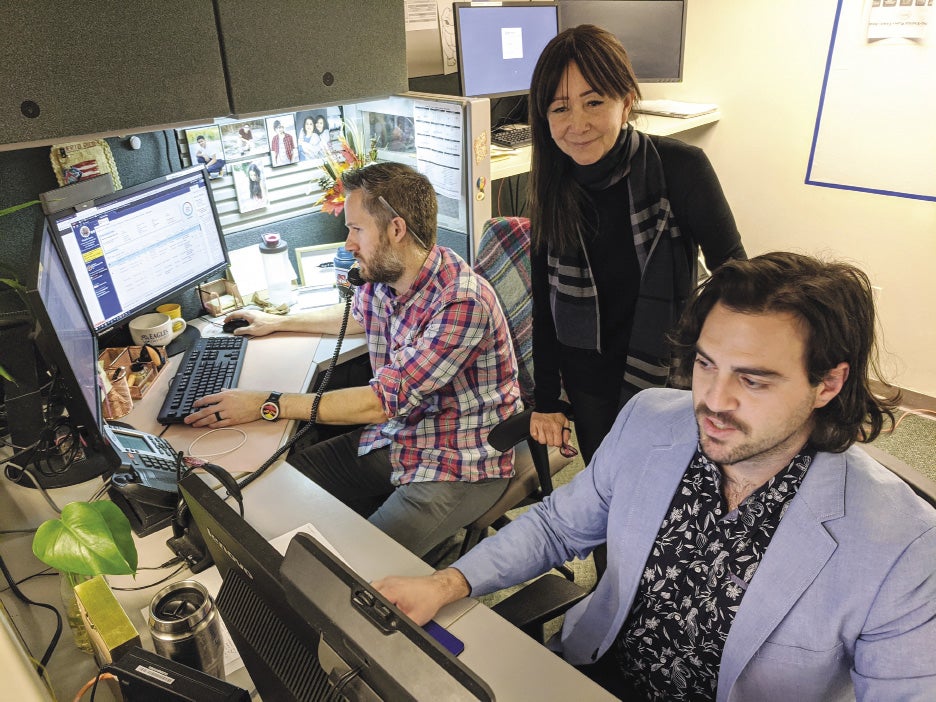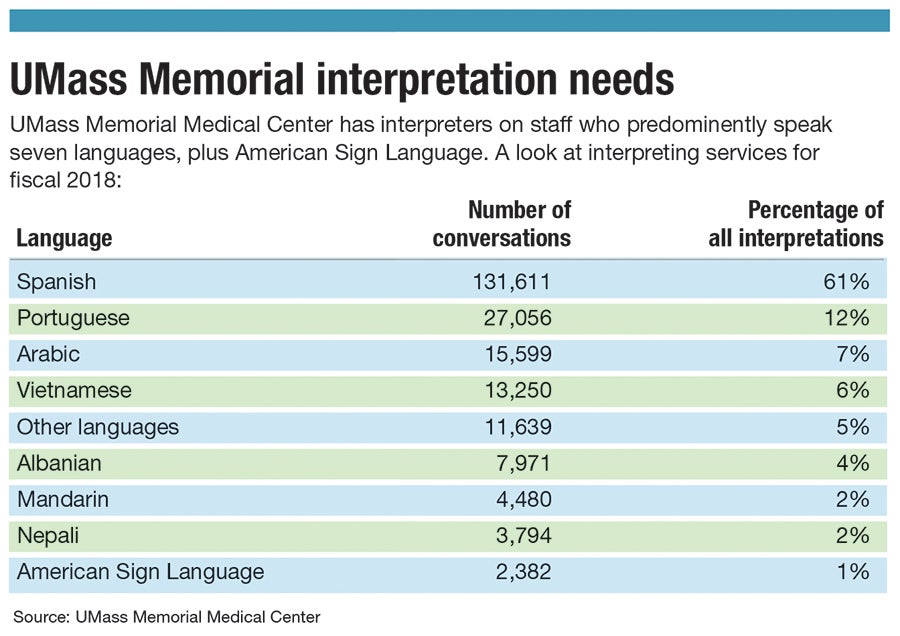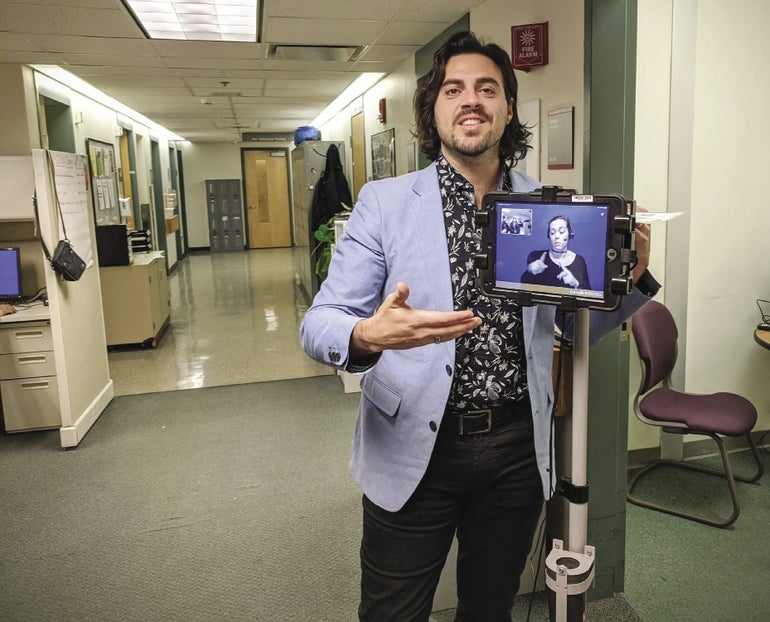As the population in and around Worcester has diversified in recent years, with more newcomers not so fluent in English, the medical community has taken what was once almost an afterthought – interpreter assistance – and made it an essential service.
Get Instant Access to This Article
Subscribe to Worcester Business Journal and get immediate access to all of our subscriber-only content and much more.
- Critical Central Massachusetts business news updated daily.
- Immediate access to all subscriber-only content on our website.
- Bi-weekly print or digital editions of our award-winning publication.
- Special bonus issues like the WBJ Book of Lists.
- Exclusive ticket prize draws for our in-person events.
Click here to purchase a paywall bypass link for this article.
As the population in and around Worcester has diversified in recent years, with more newcomers not so fluent in English, the medical community has taken what was once almost an afterthought – interpreter assistance – and made it an essential service.
At UMass Memorial Medical Center’s three Worcester campuses, the number of patients who don’t speak English fluently has rose 22% in the past five years.
Around a third of them, or about 50,000, arrive in the emergency department, when the need to quickly explain symptoms or a course of treatment may be most critical.
Interpreter services have more than made up for that increase in patients speaking a foreign language, with the number of conversations aided by translators – either in person, by phone or video – spiking by 32% in those five years.
UMass’ interpreter services department, which serves the University, Memorial and Hahnemann campuses, has grown to 34 staffers by proving its services aren’t just a nice-to-have and aren’t something that can simply be done by, say, a family member or friend, said Connie Camelo, the hospital’s director of interpreter services.

With interpreters who must pass a certification course ensuring they’re medically proficient, the department has been able to reduce readmission rates – those who return within 30 days – for non-English speakers from 31% to 26% in a few months.
Those who don’t speak English as their primary language have typically lagged their native-English counterparts, who’ve had an average readmission rate of 19% at UMass. That gap is attributed historically to either a misunderstanding in language or a lack of adequate understanding of what a patient should do after being discharged.
“Premiums, co-pays, deductibles – we know how overwhelming this can be for the average American,” said Elena Ferrantino, the site and business development manager at the Language Bank, an interpreter service provided by the Worcester human services agency Ascentria Care Alliance.
“But this becomes a major challenge for those who don’t speak the language, are not familiar with the U.S. healthcare system, and have different lifestyles and cultural backgrounds that may or may not have included preventative care,” Ferrantino said.
Responding to a diversifying patient population
Worcester’s population has grown more diverse in recent decades, and more immigrants today don’t come from English-speaking countries than in the past.
In 1990, about 15,000 Worcester residents were foreign-born, according to the U.S. Census Bureau. By 2017, that number hit nearly 40,000. The rate of city residents born elsewhere soared over that time from 9% to 22%.
As of the 2010 Census, only one of the top 10 most common home countries for Worcester immigrants speak English as their primary language. Immigrants from Brazil, who speak Portugeuse, and Vietnam made up one out of five immigrants to Worcester at that time.
UMass has quickly adjusted to a spike in the number of patients who don’t speak English as their primary language.
The hospital’s interpreter staff primarily speaks Spanish, Portuguese, Vietnamese and a handful of other common languages. Some are immigrants who have a medical background in their home country and are using the medical interpreter job to get themselves settled into a new life and career in the United States, Camelo said.

Among the expanded roster of interpreters at UMass is Kevin Correa, a Colombia native who moved to the U.S. at 12 and came with a knowledge of English basics from school.
Correa and others schedule some patient interactions in advance for those receiving outpatient services, and otherwise sit at the ready for someone in the emergency room or other units who may need help right away.
Correa said he’s found family members of patients to be increasingly thankful for interpreter services, feeling more at ease with someone who has both the language skills and medical know-how to ensure nothing’s getting lost. The service can be especially needed during delicate conversations.
“It’s definitely gotten to the point where it’s more appreciated now,” said Correa, who’s been interpreting in Spanish at UMass for four years.
Much of UMass’ expansion in interpreter services has been thanks to use of phone and video language services connecting patients to dozens more languages around-the-clock in just seconds.
The number of patient interactions through in-house staff has remained flat in the past five years, but the total number has climbed by a third during that time. The number of calls by phone is up 75% in those five years, and since video use began in 2008, it has grown to take up 9% of all interpreter interactions.
That last percentage is bound to rise sharply.
UMass has 100 portable video units in use today across its three Worcester campuses, but plans to increase to 220. For the emergency department in particular, Camelo said, the hospital wants to provide interpreter services within seconds if needed.
Providing a critical service
Language barriers can create an obstacle to patients’ access to care and present a safety issue when communications by a physician or the healthcare team are not well understood, said Dr. Maryanne Bombaugh, the president of the Massachusetts Medical Society.
“As a medical society, it is our belief that health care is a basic human right,” Bombaugh said, “and expanding efforts to make available to patients services that promote access to optimal care is not only a move in the right direction, it is an ethical obligation.”
Dr. Patricia Noga, the vice president for clinical affairs at the Massachusetts Health & Hospital Association, sees medical interpreters as making a major difference in treating patients with limited English proficiency.
Professional, real-time interpreter services can reduce verbal and cultural miscommunication, leading to more accurate diagnoses, a better understanding of and adherence to treatment plans, and improved patient satisfaction, Noga said.
“Medical interpreters often serve as active proponents for healthcare providers and patients alike,” Noga said, “and studies also indicate that professional medical interpreter services can reduce readmissions.”

